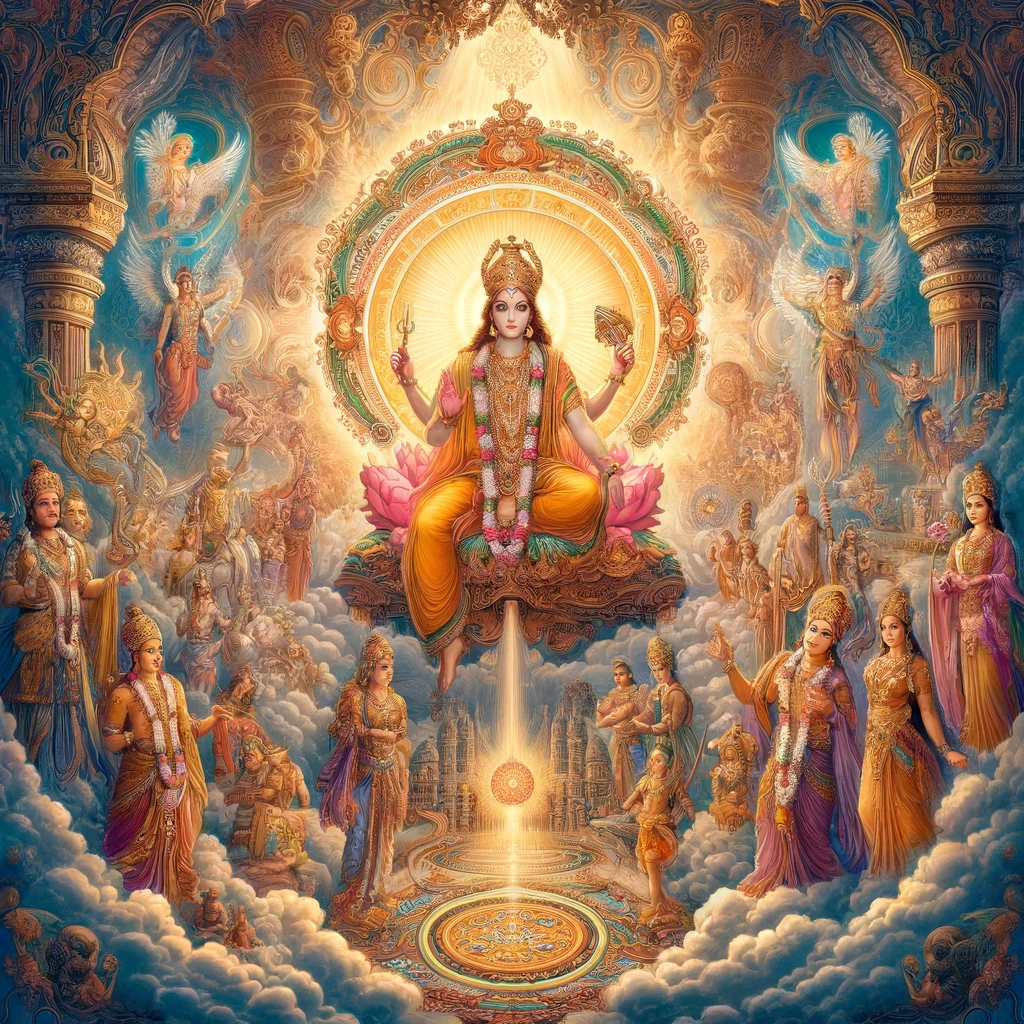ವೇಧ್ಯಃ ವೈದ್ಯಃ ಸದಾಯೋಗೀ: ವೀರಹಾ ಮಾಧವಃ ಮಧುಃ
ಅತೀಂದ್ರಿಯಃ ಮಹಾಮಾಯಃ ಮಹೋತ್ಸಾಹಃ ಮಹಾಬಲಃ ||೧೮ ||
vedhyaḥ vaidyaḥ sadāyogī: vīrahā mādhavaḥ madhuḥ
atīṃdriyaḥ mahāmāyaḥ mahotsāhaḥ mahābalaḥ || 18 ||
vedhyaḥ
Vedhya means one who should be known by everyone. Every sound in the world expresses the divine. There is no sound without the name of the Divine. In order to understand the world, we must know that Divine, who is the father of the universe. That Divine has been protecting us as our father since the beginning of time. Whoever knows Him, knows everything, as He is the knower of all things. Without His knowledge, no knowledge exists in this world.
vaidyaḥ
Vaidya is the one who is taught through all knowledge systems. He is known through all branches of knowledge, and he is the knower through all branches of knowledge. He is forever associated with the goddess of Vedic knowledge, Sri Saraswati, and he is the consort of Lakshmipati, the Lord of wealth and prosperity.
sadāyogī:
The Supreme Being is attainable through all forms of yoga. He constantly manifests in the practice of yoga. There are various types of yoga:
1) Jnana Yoga: Through Jnana Yoga, one can attain knowledge of the Supreme Being, know and realize Him.
2) Bhakti Yoga: The Supreme Being is always devoted to devotion. Devotion without ego is considered the highest quality. Without spiritual devotion, following the principles and disciplines can become selfish, and principles themselves can turn into aversion. The combination of social responsibility (horizontal line) and spiritual devotion (vertical line) is essential for genuine spirituality. The meeting point of the horizontal and vertical lines is symbolized by the Swastika (卐) in our culture and the Cross (†) in the Christian tradition.
3) Karma Yoga: According to the Supreme Being's laws, it is the great responsibility of the wise to act in a way that pleases Him. Others follow the steps taken by the wise. Therefore, the actions performed by the wise, such as observances, disciplines, meditation, steadfastness, worship, etc., should be performed in accordance with the rules.
4) Vairagya Yoga and Aishwarya Yoga: These two yogas rarely coexist. We can observe these qualities only in those yogis who are solely devoted to the Supreme Being and have His presence.
In this way, the Supreme Being is forever united with the philosophy of yoga, always known through yoga, and never separate from it.
vīrahā
The Supreme Being grants us courage, and when we display the ego of courage, the Lord, who destroys it, stands as the deity of strength within each warrior. As mentioned before, 'Vee' refers to a bird, and 'Ira' refers to the deity of vital breath. Being the vehicle of birds, residing in the wind deity, and sporting as the omnipotent warrior, the Supreme Being is known as Veeraha.
mādhavaḥ
This name has appeared before. Lakshmipathi, who incarnated in the Madhu dynasty, is known by various meanings such as the one who is denoted by all sounds and all Vedic expressions. We have seen these meanings earlier. Now, 'Ma' signifies knowledge. The Supreme Being is the master of all knowledge. He is the Guru of all the deities, and therefore, we call Him the world teacher. For that reason, we say, "Krishnam ekam jagadguru," meaning Krishna alone is the teacher of the world. Before studying any scripture, we utter the phrase "Sahanavavatu sahanau bhunaktu," which implies that may the Lord enter into the relationship between the teacher and the disciple. Thus, He is the master of all knowledge, the world teacher, and the divine Madhava.
madhuḥ
Madhu means bliss. The ocean of divine bliss is Bhagavan. Although the ocean has its limits, Bhagavan is the embodiment of infinite bliss.
atīṃdriyaḥ
Although Bhagavan exists everywhere, He cannot be perceived by our senses. This is because His nature transcends our words and thoughts. Even if we are present alongside the ocean, we cannot grasp the ocean like a handful of sand. Similarly, although we are always with Bhagavan, it is not possible for our senses to perceive Him. Such is the extraordinary nature of Bhagavan, beyond the reach of the senses.
mahāmāyaḥ
Oh, Bhagavan, the great illusionist! Even though you stand before sinners, they cannot recognize you. Prakriti, the mother nature, is the embodiment of illusion. Bhagavan is the supreme controller of the original primordial nature. The term "maya" implies both magnificence and will. Bhagavan's resolve is never in vain. He possesses an undivided will to create, sustain, and dissolve the world. Such is the immense power of Bhagavan, the supreme illusion.
mahotsāhaḥ
Bhagavan is an ever-flowing fountain of enthusiasm. His dedication to action is infinite. No matter what obstacles arise, he never relinquishes his celebratory spirit. Every task unfolds according to his divine will. Even the wise may occasionally show signs of discouragement, but Bhagavan alone is never disheartened. Hence, he is known as Mahotsaha, the supremely enthusiastic one.
mahābalaḥ
Enthusiasm and strength go hand in hand. Bhagavan possesses immeasurable strength. He possesses an immense power to fulfill desires. In Bhagavan, there is no distinction between desire and action. His desire itself is his action.


